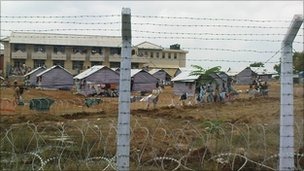 Pro-government Tamil militant leaders in Sri Lanka say the plight of their supporters has been completely ignored since the war came to an end with the defeat of Tamil Tiger rebels in May 2009.
Pro-government Tamil militant leaders in Sri Lanka say the plight of their supporters has been completely ignored since the war came to an end with the defeat of Tamil Tiger rebels in May 2009.
While human rights groups are not impressed with the government’s rehabilitation programme for ex-Tamil Tiger members, leaders of rival Tamil groups say their followers have also not been accommodated at all in post-war society.
Former MP and People’s Liberation Organisation for Tamil Ealam (Plote) leader Dharmalingam Siddharthan has warned of "disastrous consequences" if the authorities continue to ignore the plight of his supporters.
"Like the Tamil Tigers, we have trained and armed thousands of the youths," he told the BBC Sinhala service.
"Now the majority of them are jobless."
Plote did not secure a single seat in the last parliamentary elections.
Mr Siddharthan stresses that while he is not opposed to the government’s initiative to rehabilitate former Tamil Tigers, other Tamil groups should not be forgotten.
"They only talk about the Tamil Tigers’ rehabilitation. When our boys leave us, they have no means to support themselves or their families. They may end up involved in criminal activities."
‘Killing many’
Over 8,000 former Tamil Tiger rebels remain in custody and the government insists that its rehabilitation programmes for them are making progress.
But no such effort appears to have been made for other Tamil militant groups who – unlike the Tamil Tigers – agreed to abide by the provisions of the 1987 Indo-Lanka peace accord.
India deployed thousands of soldiers in Sri Lanka to implement the accord but months later, fierce fighting erupted between the Indian army and the Tamil Tigers.
The Tigers declared themselves as the sole representatives of Tamils and set about disbanding other militant groups.
"After 1990, thousands of our cadres secretly stayed in Sri Lanka while thousands more fled to India – because at that time the government was searching for them and the Tamil Tigers were also killing many," says former North Eastern province Chief Minister Varadaraja Perumal.
He is the leader of the anti-Tamil Tiger militant group, the Ealam People’s Revolutionary Liberation Front (EPRLF).
His administration was dissolved by the Sri Lankan government within months of his efforts unilaterally to declare an independent state for the Tamils in Sri Lanka.
For two decades since then, he has been living in India.
Weapons and cadres
"Hundreds of cadres and their families now live in Tamil Nadu – often in difficult conditions in refugee camps," Mr Perumal said.
He says that life has proved equally difficult for those of his followers who remained in Sri Lanka.
All this is a far cry from the height of the war, when the government was desperate to win over militant groups in return for protection from the Sri Lankan state.
Those who defected offered to provide local knowledge of rebel positions to Sri Lankan troops and helped the army to identify Tamil Tiger sympathisers.
It has been widely alleged that the breakaway Tamil Tiger leader Col Karuna – who is now a junior cabinet minister – helped the security forces in its campaign against the Tigers in the east of the country.
Another well known defector, Douglas Devananda, is also in the cabinet.
Under the ceasefire agreement brokered by the Norwegian government in 2002, all Tamil militant groups were required to surrender their arms.
But many of them continued to have weapons and cadres of their own.
Both the government and former militant leaders admit that they have no proper estimates as to how many of them are keeping arms.
"They only know how to use the weapons – so if the government does not take action to rehabilitate them and offer new opportunities, the consequences might be disastrous for the Tamil community," Mr Siddharthan said.
But the minister in charge of rehabilitation, D E W Gunasekara, promised that non-Tamil Tiger militants will not be ignored.
"We need to take some more measures economically to empower them," he said.
The minister admits that he already discussed the issue with former militant leaders.
"My ministry will definitely come up with a specific programme to help them."
Human rights violations
Meanwhile, there have been reports that a climate of fear and intimidation still prevails in the north – especially in the former rebel stronghold of Jaffna.
There have been reports of widespread kidnappings and killings.
Some of these crimes are directly linked to former militants, according to Mr Siddharthan.
"There are certain criminal cases we know of in which ex-members of our organisations were involved because they have no means and only know how to carry weapons. They are not rehabilitated. They must be provided with the jobs, they must be trained to integrate with the community," he says.
"These are big problems the Tamil community is going to face in the near future."
Plote leader Mr Siddharthan does not deny that his group was responsible for some crimes in the past.
"Yes, we were accused of abductions and many other violations. I admit that. But it was a counter-action against the Tamil Tigers," he said.
"They had been killing hundreds of our men, so we were forced to retaliate. We did not give those orders – they came from lower-ranking members."
(For updates you can share with your friends, follow TNN on Facebook and Twitter )
